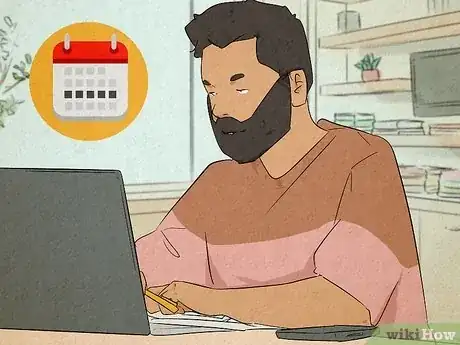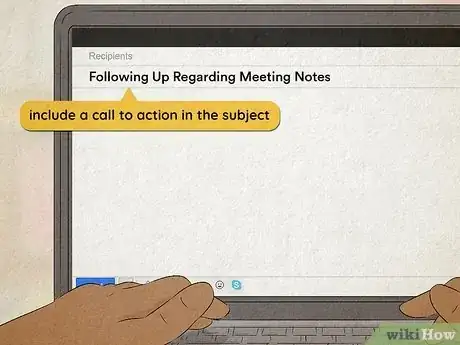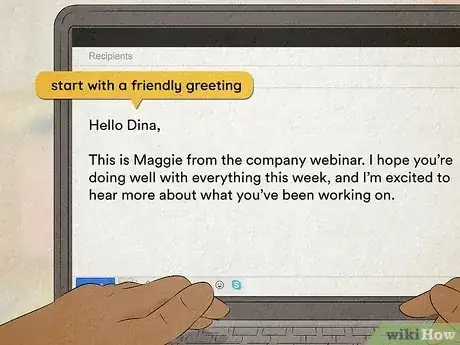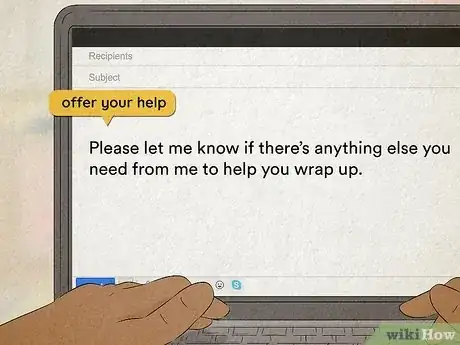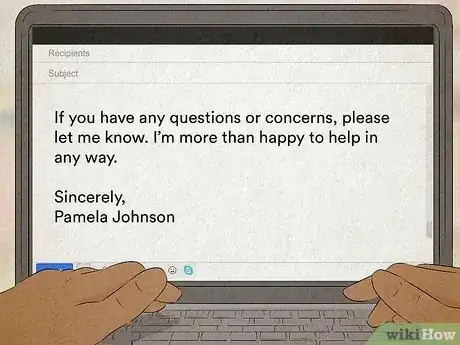This article was co-authored by Maureen Taylor and by wikiHow staff writer, Hunter Rising. Maureen Taylor is the CEO and Founder of SNP Communications, a leadership communications company based in the San Francisco Bay Area. She has been helping leaders, founders, and innovators in all sectors hone their messaging and delivery for almost 30 years, and has worked with leaders and teams at Google, Facebook, Airbnb, SAP, Salesforce, and Spotify.
This article has been viewed 61,724 times.
Maybe you asked someone to do something or you need to let them know about a meeting, but how can you send a gentle reminder without sounding rude or impatient? It's pretty easy for a person to get caught up with other things, but there are still great ways to send them a polite reminder. We've got tons of tips and examples on what to say over email or text, so keep reading for how to craft the perfect message that's bound to get a response.
Things You Should Know
- Give people at least a week to get back to you before sending a reminder.
- Keep your request clear and direct. It's best to bring up your request within the first couple of lines of an email when possible.
- Maintain an appreciative tone in your email. To encourage a response, offer help or an out for the recipient.
Steps
Give them a week before sending a reminder.
-
Waiting a week between messages sounds less pushy. If it’s only a few days after you made your original request, you may not have given the person enough time to complete it yet. After about 7 days, it’s okay to send a follow-up email or text since your original message may have gotten lost in their inbox and they didn’t see your request.[1] X Research source
- If your request is time-sensitive and you need to hit an upcoming due date, it’s okay to reach out a couple of days sooner.
Include a call to action in an email subject line.
-
The person will immediately know the task from reading the subject line. A generic subject line like “Action Required” or “Following Up” sounds vague or may make someone feel bad for taking a long time. Specify exactly what you’re expecting from the person with as few words as possible. You could even include how long the task will take so the person knows how much of a commitment it is.[2] X Trustworthy Source Harvard Business Review Online and print journal covering topics related to business management practices Go to source
- “Following Up Regarding Meeting Notes”
- “Action Needed: Survey Response”
- “Next Steps for Creative Project”
- “5 Minutes - Feedback Form Needed”
Send a reminder email in the original thread.
-
The person will be able to see your original message and request. If there are important details you don’t want the person to forget about, keep the email thread going and forward the message to them again. That way, the person won’t have to search their inbox to find what you need from them.[3] X Trustworthy Source Harvard Business Review Online and print journal covering topics related to business management practices Go to source
Open with a friendly greeting.
-
Starting on a positive note sets the tone for the rest of the reminder. Right at the beginning of your message, greet the person in a kind, professional way to get the ball rolling. If you haven’t talked to the person very much, quickly reintroduce yourself so they remember who you are. Include a short personalized sentence to make them feel respected.[4] X Research source
- “Hi Julie, this is Eric from last week’s team meeting. You made some great points when you were leading our discussion.”
- “Hello Dina, this is Maggie from the company webinar. I hope you’re doing well with everything this week, and I’m excited to hear more about what you’ve been working on.”
- “Dear Mr. Sherman, thank you so much for being so organized and on top of everything with this marketing project.”
- “Hello again Mark! We hope that you’re doing well.”
Make a direct request early on.
-
Reminding the person right away makes your request clear. If you wait until the end of a message to remind someone, they may only skim the first few lines and miss what you’re asking for. Right after your greeting, give the person a gentle reminder or ask them a question about their progress. You can always give the person more context afterwards.[5] X Trustworthy Source Harvard Business Review Online and print journal covering topics related to business management practices Go to source
- “This is just a friendly reminder that survey responses are due next week, and we’d love to hear your feedback on how we can improve.”
- “Did you get a chance to look over the documents I sent over? I’m nearly ready to submit them and just need your approval.”
- “Last week, we mentioned collaborating on a creative project together. Is that something you’re still interested in doing?”
- “Just a heads-up that there’s a meeting today. We want to make sure we get the whole team together.”
Show your appreciation.
-
You’re more likely to get a response if you use a warm and polite tone. Tone can be a little tough to read in an email or text, so even a neutral sentence may sound negative. Be polite and let the person know that you really care about what they’re doing. If they feel respected, they're more likely to reach back out to you.[6] X Trustworthy Source Harvard Business Review Online and print journal covering topics related to business management practices Go to source
- “Given your experience with these types of projects, I know that any feedback you have would help us improve.”
- “We really appreciate all the hard work you’ve done for us and we can’t wait to hear what you have to say.”
- “Your help would really help push this presentation to the next level.”
- “We value your opinion, and your recommendations will help out tremendously.”
Ask if there’s anything you can help with.
-
Offering to help the person takes some pressure off them. If you’re asking the person for a big favor or help with a difficult task, let them know that you have their back. The recipient is more likely to respond if they know that you’re there to support them and help them in any way that you can.[7] X Research source
- “Please let me know if there’s anything else you need from me to help you wrap up.”
- “I’m here if you have any questions or concerns about the project going forward.”
- “If there’s anything else that can help you make a decision, please feel free to reach out.”
- “I’m available to chat if you’re unsure of the next steps and need assistance.”
Give the recipient an out.
-
An out lets the person know it’s okay if they can’t follow through. The person you’re talking to may not respond if they aren’t comfortable with the original request. Let them know that you’re willing to work with them and able to offer some alternatives so they don’t feel too pressured by you.[8] X Trustworthy Source Harvard Business Review Online and print journal covering topics related to business management practices Go to source
- “If there’s someone else I should contact about this information, please let me know.”
- “I understand if you’ve got too much on your plate right now, so just let us know if you need more time.”
- “If you don’t feel comfortable working on this assignment, feel free to let us know so we can reassign it.”
- “We’re open to suggestions if you think there’s another direction we could take this project.”
Keep your message short.
-
Your request might get lost if you send a longer message. If the person opens up your message and sees multiple long paragraphs, there’s more of a chance that you’ll miscommunicate what you need. Only say as much as you need to so you don’t overwhelm or confuse the person on the receiving end.[9] X Research source
End an email with your signature.
-
Your signature gives the recipient the best way to reach out to you again. At the end of your email, include your full name, email address, and any social media links. That way, they get a better idea of who they’re talking to and where they should respond to your request. Try using a sign off like:[10] X Research source
- Best
- Sincerely
- Kind regards
- Thanks again
Call or visit the person for an urgent response.
-
You can get an immediate response by talking directly to the person. If you need an answer right away or there’s a deadline approaching, don’t be afraid to pick up the phone or drop by their office to chat. That way, the person can sense the urgency in your voice and you can get an answer from them without waiting.[11] X Research source
- “Hey, I wanted to remind you that it’s Julie’s birthday today.”
- “This is just a friendly reminder that there’s a meeting this afternoon at 2:30.”
- “Did you get a chance to look over those numbers I sent last week? They’re due tomorrow and would appreciate it if you could prioritize them.”
Sample Reminder Email Template
-
Subject: Action Needed - Survey ResponseDear Zach,This is Pamela from last week’s webinar. It was so nice seeing you, and I hope everything is going well for you so far this week.I wanted to send a friendly reminder that the company survey we discussed during the meeting is due next Friday. We want to continue making improvements for our team, and we appreciate all the helpful feedback that you have to offer.If you have any questions or concerns, please let me know. I’m more than happy to help in any way.Sincerely,Pamela Johnsonpjohnson@gmail.com
You Might Also Like
 33 Sweet & Romantic Apology Messages for Your Love
33 Sweet & Romantic Apology Messages for Your Love

 How Long Should I Wait to Text My Ex-Girlfriend?
How Long Should I Wait to Text My Ex-Girlfriend?
 How Long Does the No Contact Rule Take to Work?
How Long Does the No Contact Rule Take to Work?



 What Should You Do After Your Girlfriend Lies to You?
What Should You Do After Your Girlfriend Lies to You?
 How Normal Is Fighting in a Relationship? Healthy vs. Toxic Fights
How Normal Is Fighting in a Relationship? Healthy vs. Toxic Fights



 How to Deal with Confusing People: 11 Ways to Navigate the Situation
How to Deal with Confusing People: 11 Ways to Navigate the Situation

References
- ↑ https://www.forbes.com/sites/forbesbusinesscouncil/2021/12/09/six-tips-for-crafting-an-effective-follow-up-message/?sh=74445d592372
- ↑ https://hbr.org/2021/01/how-to-follow-up-with-someone-whos-not-getting-back-to-you
- ↑ https://hbr.org/2021/01/how-to-follow-up-with-someone-whos-not-getting-back-to-you
- ↑ https://www.inc.com/guides/2010/06/email-etiquette.html
- ↑ https://hbr.org/2021/08/how-to-write-better-emails-at-work
- ↑ https://hbr.org/2021/01/how-to-follow-up-with-someone-whos-not-getting-back-to-you
- ↑ https://www.forbes.com/sites/dailymuse/2016/11/11/the-follow-up-email-that-works-even-better-than-just-checking-in/?sh=36f486fe7f86
- ↑ https://hbr.org/2021/01/how-to-follow-up-with-someone-whos-not-getting-back-to-you
- ↑ https://www.forbes.com/sites/forbesbusinesscouncil/2021/12/09/six-tips-for-crafting-an-effective-follow-up-message/?sh=74445d592372
About This Article

